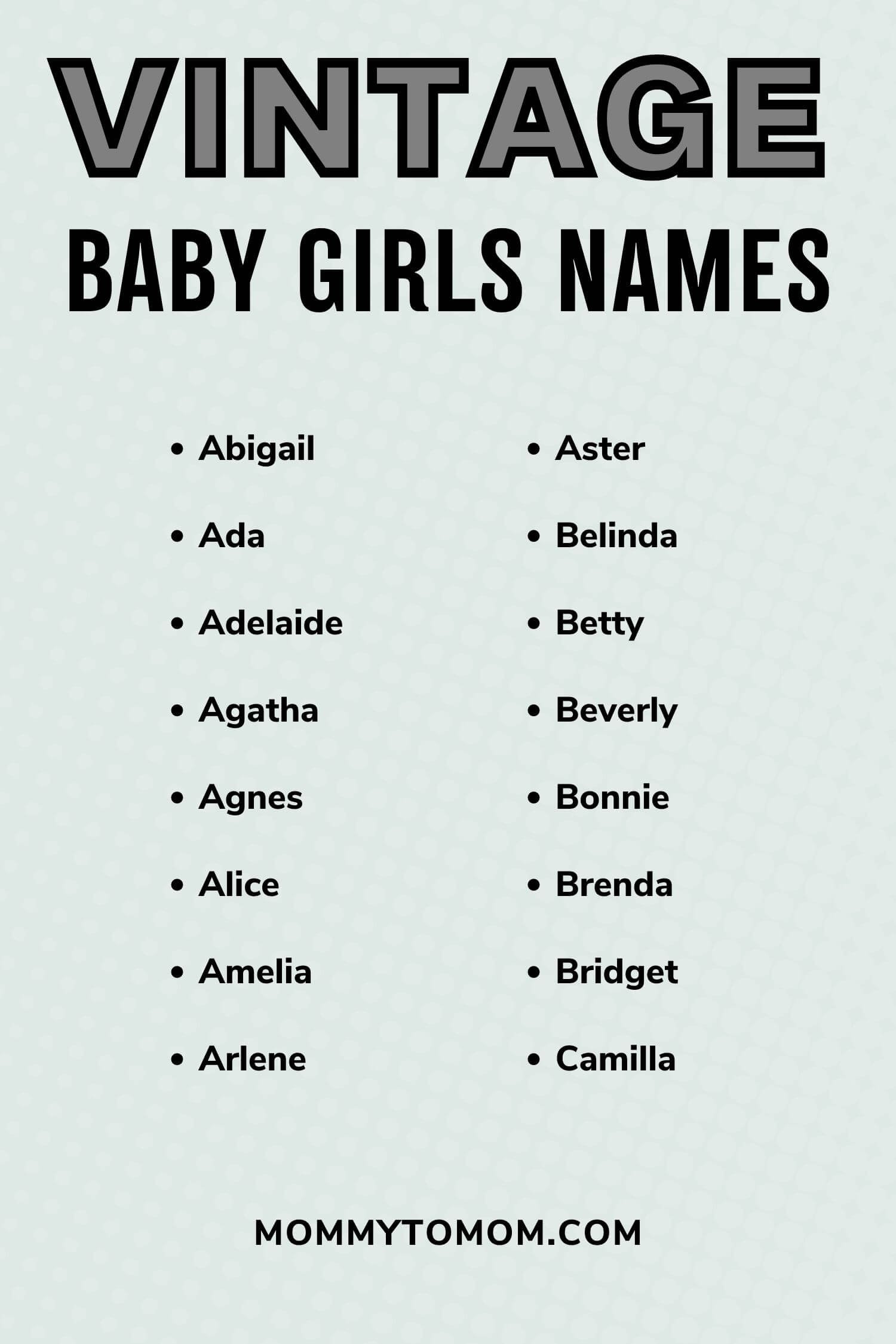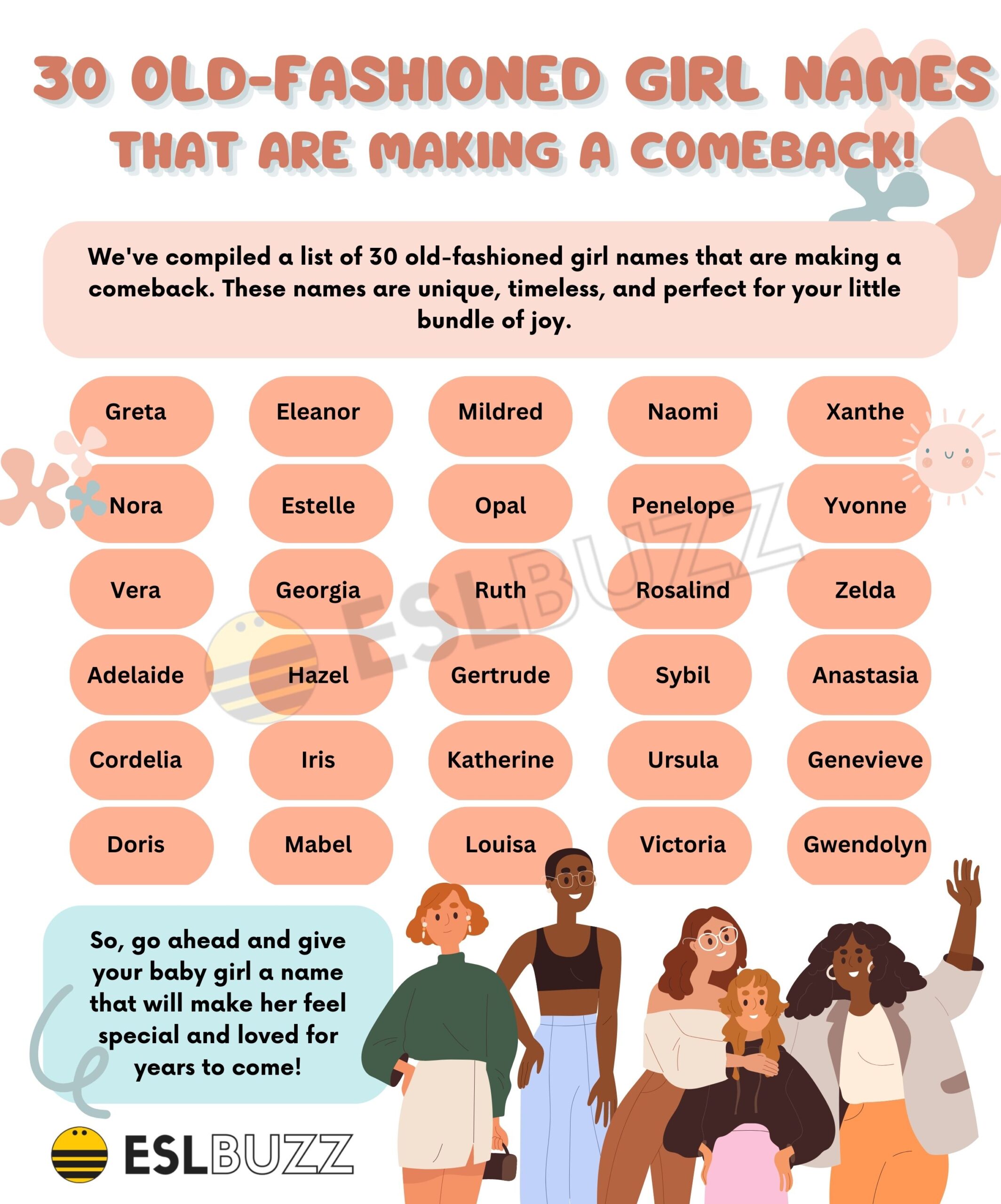A Journey Through Time: Exploring the Charm of Old-Fashioned Women’s Names
Related Articles: A Journey Through Time: Exploring the Charm of Old-Fashioned Women’s Names
Introduction
With enthusiasm, let’s navigate through the intriguing topic related to A Journey Through Time: Exploring the Charm of Old-Fashioned Women’s Names. Let’s weave interesting information and offer fresh perspectives to the readers.
Table of Content
A Journey Through Time: Exploring the Charm of Old-Fashioned Women’s Names

The world of names is a rich tapestry woven with threads of history, culture, and personal significance. Among these threads, old-fashioned names stand out, evoking a sense of nostalgia and elegance. These names, often rooted in tradition and classic literature, offer a unique charm that transcends trends and resonates with a timeless appeal.
This exploration delves into the fascinating world of old-fashioned women’s names, examining their origins, meanings, and enduring allure. We will navigate the alphabet, from A to Z, uncovering the stories behind these names and their enduring relevance in the contemporary world.
A – Agnes: This name, derived from the Greek word "agnus" meaning "lamb," symbolizes purity, innocence, and gentleness. Agnes, a patron saint of chastity, has been a popular choice for centuries, finding its way into literature and art.
B – Beatrice: With its roots in Latin, "Beatrice" means "she who brings happiness." This name, often associated with Dante’s beloved in the Divine Comedy, evokes a sense of grace, intelligence, and unwavering love.
C – Charlotte: This name, of French origin, means "free man." Charlotte, known for its elegant sound and connection to royalty, has been a popular choice for centuries, with notable figures like Charlotte Bronte and Queen Charlotte of England.
D – Dorothea: Meaning "gift of God" in Greek, Dorothea embodies kindness, compassion, and a strong sense of faith. This name, often associated with the patron saint of flowers, evokes a sense of warmth and nurturing.
E – Eleanor: With its origins in Old German, "Eleanor" means "light" or "torch." This name, associated with strong and independent women throughout history, conveys a sense of brilliance, determination, and leadership.
F – Florence: This name, derived from the Latin word "florens" meaning "flourishing," evokes images of beauty, prosperity, and abundance. Florence Nightingale, a renowned nurse, exemplifies the spirit of compassion and dedication associated with this name.
G – Grace: This name, meaning "favor" or "mercy," embodies elegance, kindness, and a sense of inner beauty. Grace Kelly, the iconic actress and princess, embodies the charm and grace associated with this name.
H – Hazel: This name, derived from the hazel tree, symbolizes wisdom, knowledge, and a connection to nature. Hazel, with its soft and gentle sound, evokes a sense of tranquility and serenity.
I – Iris: This name, meaning "rainbow" in Greek, symbolizes hope, beauty, and a connection to the divine. Iris, the Greek goddess of the rainbow, represents a bridge between heaven and earth, symbolizing a message of peace and harmony.
J – Juliet: This name, of Italian origin, means "youthful." Juliet, immortalized in Shakespeare’s Romeo and Juliet, evokes a sense of passion, romance, and enduring love.
K – Katherine: This name, of Greek origin, means "pure" or "clean." Katherine, associated with strength, intelligence, and unwavering faith, has been a popular choice for centuries, with notable figures like Katherine Hepburn and Catherine the Great.
L – Lilac: This name, derived from the fragrant lilac flower, symbolizes love, youthfulness, and innocence. Lilac, with its delicate and feminine sound, evokes a sense of sweetness and charm.
M – Margaret: This name, of Greek origin, means "pearl." Margaret, known for its classic elegance and connection to royalty, embodies strength, grace, and resilience.
N – Natalie: This name, of Latin origin, means "Christmas Day." Natalie, with its soft and melodious sound, evokes a sense of warmth, joy, and celebration.
O – Olivia: This name, of Latin origin, means "olive tree." Olivia, known for its classic beauty and connection to nature, embodies peace, wisdom, and prosperity.
P – Penelope: This name, of Greek origin, means "weaver." Penelope, the faithful wife of Odysseus in Homer’s Odyssey, embodies loyalty, intelligence, and unwavering devotion.
Q – Quinne: This name, of Irish origin, means "descendant of Conn." Quinne, with its strong and distinctive sound, evokes a sense of strength, independence, and a connection to tradition.
R – Rose: This name, derived from the rose flower, symbolizes love, beauty, and passion. Rose, with its romantic and timeless charm, evokes a sense of elegance and grace.
S – Sophia: This name, of Greek origin, means "wisdom." Sophia, associated with knowledge, intelligence, and a strong sense of purpose, embodies a spirit of curiosity and exploration.
T – Theodora: This name, of Greek origin, means "gift of God." Theodora, known for its classic elegance and connection to history, embodies strength, compassion, and a spirit of adventure.
U – Ursula: This name, of Latin origin, means "little she-bear." Ursula, associated with strength, courage, and a fierce spirit, evokes a sense of independence and determination.
V – Victoria: This name, of Latin origin, means "victory." Victoria, often associated with royalty and triumph, embodies strength, resilience, and a spirit of achievement.
W – Winifred: This name, of Welsh origin, means "blessed peace." Winifred, with its soft and melodic sound, evokes a sense of tranquility, kindness, and a connection to nature.
X – Xenia: This name, of Greek origin, means "hospitality." Xenia, with its unique and distinctive sound, embodies warmth, generosity, and a welcoming spirit.
Y – Yvette: This name, of French origin, means "yew tree." Yvette, with its delicate and feminine sound, evokes a sense of grace, elegance, and a connection to nature.
Z – Zelda: This name, of German origin, means "battle maiden." Zelda, with its strong and independent spirit, evokes a sense of courage, resilience, and a pioneering spirit.
FAQs about Old-Fashioned Women’s Names:
Q: Why are old-fashioned names becoming popular again?
A: The resurgence of old-fashioned names is often attributed to a desire for uniqueness, a connection to tradition, and a sense of timeless elegance. These names offer a departure from trendy, modern options, evoking a sense of history and sophistication.
Q: Are old-fashioned names suitable for modern times?
A: Old-fashioned names, while rooted in tradition, can be perfectly adapted to modern times. Their classic elegance and enduring appeal transcend trends and offer a sense of sophistication and individuality.
Q: How can I choose an old-fashioned name for my child?
A: When selecting an old-fashioned name, consider its meaning, pronunciation, and potential nickname options. Research the name’s history and cultural significance to ensure it aligns with your values and preferences.
Tips for Using Old-Fashioned Women’s Names:
- Consider the name’s meaning: Choose a name that resonates with your values and aspirations for your child.
- Think about pronunciation: Ensure the name is easy to pronounce and spell.
- Explore nickname options: Consider potential nicknames that might arise from the chosen name.
- Research the name’s history: Understand the name’s cultural significance and historical associations.
- Trust your instincts: Ultimately, choose a name that feels right for your child and family.
Conclusion:
The allure of old-fashioned women’s names lies in their timeless elegance, rich history, and enduring charm. These names, often rooted in tradition and classic literature, offer a unique sense of sophistication and individuality. As we navigate the ever-changing world of names, the enduring appeal of these classic choices reminds us of the enduring power of tradition and the timeless beauty of language.








Closure
Thus, we hope this article has provided valuable insights into A Journey Through Time: Exploring the Charm of Old-Fashioned Women’s Names. We hope you find this article informative and beneficial. See you in our next article!